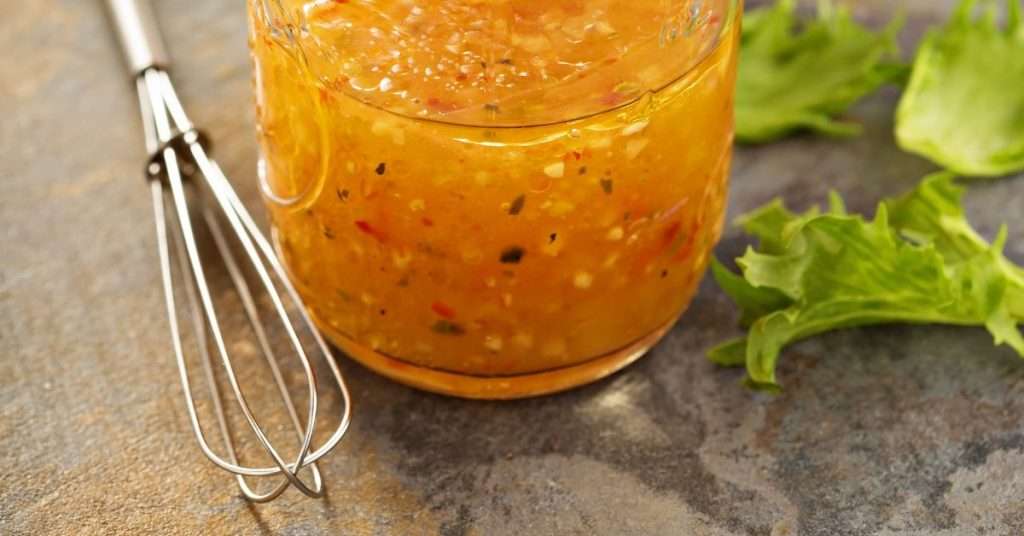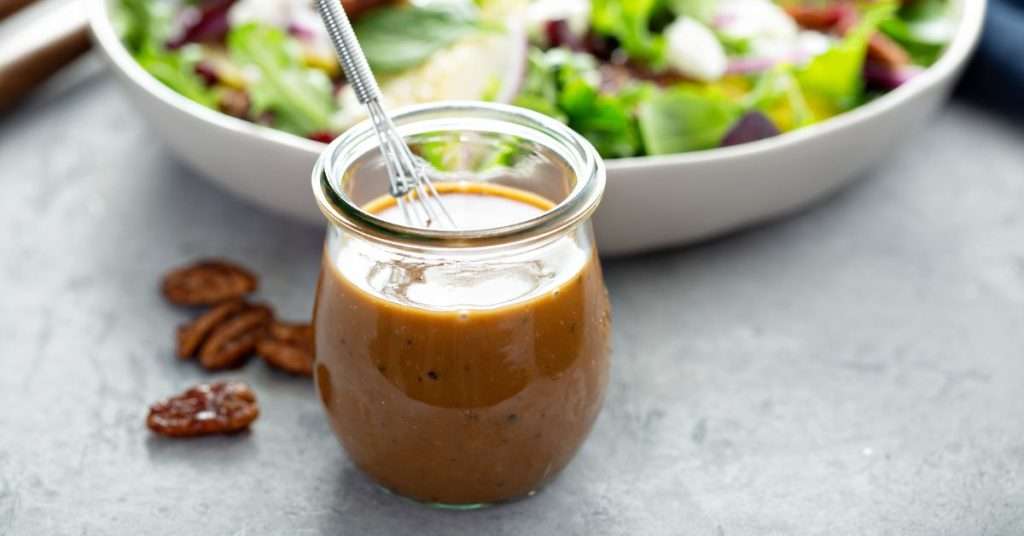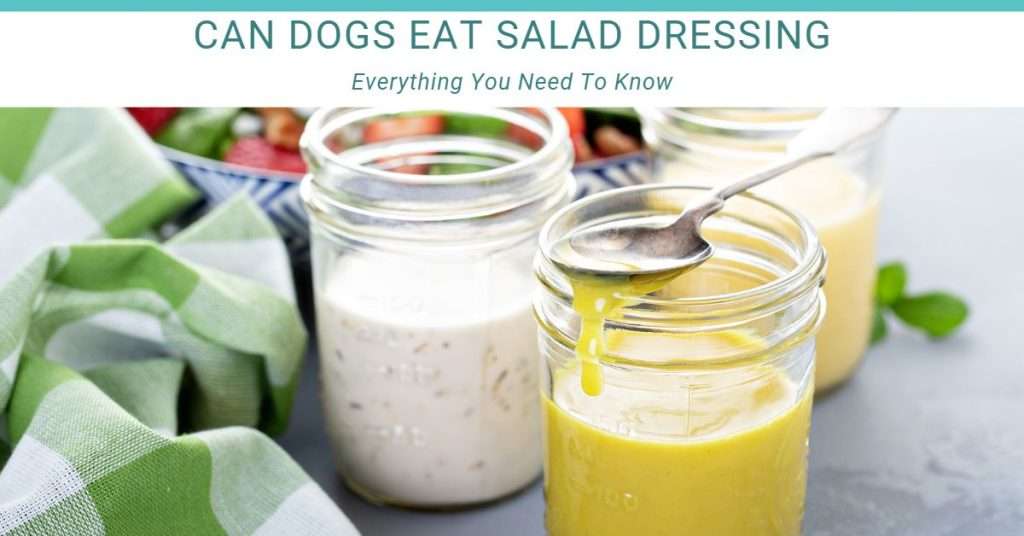Salad Dressing Dilemma: Safe for Dogs?
Welcome, concerned dog owners! If you’ve ever wondered whether it’s safe to share your favorite salad dressing with your furry friend, you’re in the right place. In this comprehensive guide, we’ll explore the question, “Can dogs eat salad dressing?” and provide you with all the essential information and guidelines you need to make an informed decision. Let’s dive in!
Can Dogs Eat Salad Dressing?
Let’s spill the tea on salad dressings for dogs! While some ingredients in store-bought dressings might make their taste buds dance, others can turn into a canine catastrophe. You really should not allow your dog to eat salad dressing.
Onions, garlic, spices, artificial sweeteners, and excessive salt lurking in these dressings can throw your pup’s tummy into a twist and lead to a pawful of problems.
So, instead of dressing up their meals with risky condiments, why not fetch some dog-friendly treats or approved flavors to keep their tails wagging? Remember, it’s always better to play it safe and keep the salad dressing for your own salads.
Understanding Dog Nutrition
Here are the key points to understand about dog nutrition:
- Balanced Diet: Dogs need a balanced diet that includes appropriate amounts of protein, carbohydrates, fats, vitamins, and minerals to thrive.
- Fats and Oils: Fats and oils are important in a dog’s diet, but it’s essential to choose the right types and quantities. Introducing too much fat into a dogs diet can have serious health implications including Pancreatitis.
- Suitable Types: Some healthy fat sources for dogs include fish oil, coconut oil, and olive oil, which provide essential fatty acids.
- Unsuitable Types: Avoid feeding dogs with fats or oils that are high in saturated or trans fats, as they can contribute to obesity and other health issues.
- Consult a Veterinarian: It’s recommended to consult a veterinarian for guidance on the specific nutritional needs of your dog, including appropriate fat sources and quantities.
Based on the above information, you can see that salad dressing does not really fit into a dog’s nutritional needs.
Salad dressings come in various flavors and ingredients, but not all of them are dog-friendly. It’s important to know which ones are safe for your furry friend. Here, we’ll discuss the most common types of salad dressings, their ingredients, and how they might affect your dog’s health. Let’s find out if your dog can enjoy that dressing you love so much!
The Worst Salad Dressings for a Dog’s Health:
Salad dressings come in various flavors and ingredients, but not all of them are dog-friendly. Here, we’ll discuss the most common types of salad dressings, their ingredients, and how they might affect your dog’s health.
While it’s best to avoid feeding salad dressings to your furry friend, some types are particularly harmful. Here are some of the worst salad dressings you should steer clear of:
Creamy Caesar Dressing
Caesar dressing is a popular salad dressing. It is important to be aware that Caesar Dressing can be toxic to dogs. The main ingredients in Caesar dressing, garlic and onions, can cause gastrointestinal upset, anemia, and even damage to red blood cells in dogs.
High fat content is another potential danger of Caesar dressing for dogs. Fat can lead to pancreatitis, a painful and potentially life-threatening condition.
If you are feeding your dog a salad, it is best to avoid dressing it with Caesar dressing. There are many other safe and delicious dressings that you can use, such as olive oil and vinegar, or ranch dressing made with non-toxic ingredients.

Ranch Dressing
Ranch dressing Is very similar to Caesar dressing. Ranch also contains garlic and onion powder, which are both toxic to dogs in larger amounts. Either of them can cause gastrointestinal upset, anemia, and even damage to red blood cells in dogs.
High fat content and added preservatives can also contribute to obesity and digestive issues in dogs. If you are feeding your dog a salad, it is best to avoid dressing it with ranch dressing.

Italian Dressing
Italian dressing typically includes garlic, and occasionally onion, both of which can pose a health risk to dogs if ingested.
Furthermore, certain brands might incorporate artificial sweeteners, such as xylitol, which can be extremely hazardous to dogs and may lead to severe hypoglycemia. The effects of this artificial sweetener can often lead to death.

Thousand Island Dressing
Thousand Island dressing usually contains ingredients like garlic, onion, mayonnaise, ketchup and sometimes even raisins, which are toxic to dogs. It only takes a very small amount of raisins to kill a dog. This dressing should absolutely be avoided.
High-fat and calorie content can lead to weight gain and associated health problems in dogs. In particular, the excessive fat in thousand island dressing can cause pancreatitis, a serious inflammation of the pancreas. Pancreatitis can be life-threatening, so it is important to avoid feeding your dog this type of dressing.

Balsamic Vinaigrette
Balsamic Vinaigrette is generally less harmful to dogs then the other salad dressings in this list. While it may be less harmful it is still not recommended for dog consumption.
Dogs stomach and digestive tract do not handle the acidic nature of this type of dressing. It can lead to digestive upset and general irritation.

Remember, these are just a few examples of the worst salad dressings for dogs. It’s essential to read the ingredient labels carefully and avoid dressings that contain harmful ingredients like garlic, onions, raisins, or artificial sweeteners. Opting for dog-safe alternatives or homemade dressings specifically designed for dogs is always the best choice.
By being aware of the potential risks associated with certain salad dressings, you can ensure the well-being and health of your furry friend. You should also have a good reason for even considering using salad dressing on the dogs food. It is not needed to create a balanced diet.
Potential Risks and Allergies
Feeding salad dressing to your dog can carry potential risks and allergies. Here are the key points to consider and manage:
- Risks and Allergies: Salad dressings may cause gastrointestinal (GI) distress in dogs, leading to loss of appetite, nausea, vomiting, diarrhea, excessive drinking, and lethargy.
- Monitoring at Home: Most symptoms can be monitored at home, but if your dog doesn’t recover quickly, consult a veterinarian for guidance.
- Hydration and Exercise: Ensure your dog has access to fresh water and take it for regular walks to aid digestion and relieve itself. We can stress this enough, the dog must have a clean bowl of fresh water available at all times. Dehydration due to GI issues will certainly add to the dogs distress. It is easily prevented with fresh water.
Managing GI Distress:
- Bland Diet: After vomiting and diarrhea have subsided, introduce a bland diet consisting of easily digestible foods like boiled chicken and rice.
- Gradual Transition: Slowly transition your dog back to its regular food by gradually mixing increasing proportions of the regular food with the bland diet. This should take between 3 and 5 day to transition back to the dog’s normal food.
Can dogs eat salad with ranch dressing?
Ranch dressing should not be fed to your dog. The high amount if fat can cause harm to the dog’s pancreas. Often this dressing contains onions and garlic as well.
Can dogs eat Caesar salad dressing?
In short, it is not recommended to feed Caesar dressing to dogs. Several ingredients found in Caesar dressing can be harmful to their health. Garlic and onion, for example, are toxic to dogs in large quantities and can lead to serious issue known as Heinz body anemia. Even in smaller amounts, these ingredients can cause digestive problems and discomfort for your dog.
Can my dog eat my leftover salad?
If the salad is already dressed it should not be fed to your dog. Dog’s can eat plain salad as long as it does not contain onions, garlic, grapes, raisins or any other toxic ingredients that dogs can’t eat.
We hope this guide has been helpful to you. If you have any questions or experiences to share, please feel free to comment below. To learn about other condiments that dogs should not eat, check our related post – Top 10 condiments dogs should not eat.



